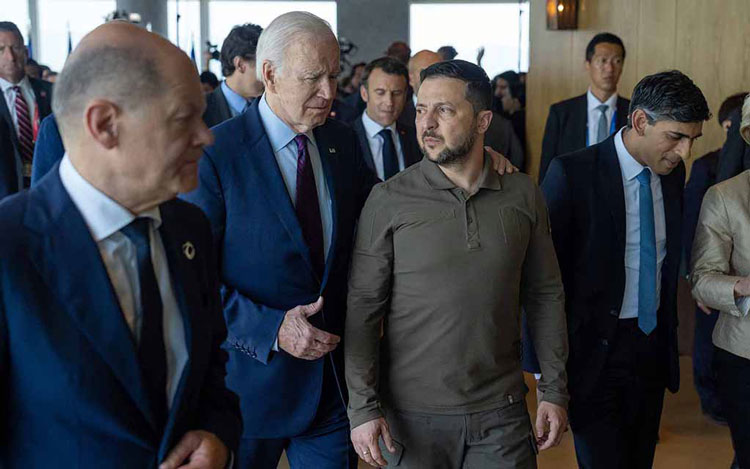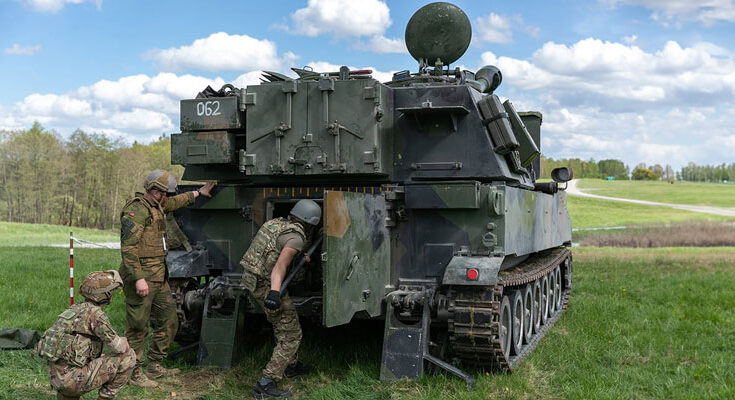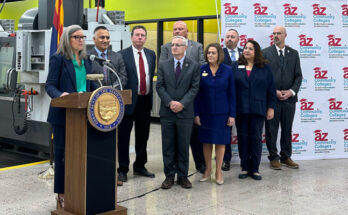Photo by Sgt. Spencer Rhodes/Army National Guard: Ukrainian artillerymen load an M109 self-propelled howitzer at Grafenwoehr Training Area in Germany on May 12, 2022, while training with U.S. and Norwegian soldiers. The howitzers are just some of the weapons Ukraine has received since the Russian invasion.
By Ian McKinney/Cronkite News
WASHINGTON – Two years after Russia’s invasion of Ukraine, members of Arizona’s congressional delegation remain just as divided as ever on what role the U.S. should play in the war as it enters its third year.
While many of the state’s Republicans are increasing their calls to take a hard look at the $75 billion in aid so far, and a pending request for $60 billion more, Democrats have steadfastly called for aid to continue, saying it is now “more important now than ever.”
“Two years in, it is more clear than ever what (Russian President Vladimir) Putin’s intent is, and it’s not to stop at Ukraine. It is to have Russian troops march forward into NATO territory,” Rep. Greg Stanton, D-Phoenix, said Friday. “That is unacceptable to America.”
However, some GOP members said it is not in the best interest of the U.S. to get further involved in a war that continues to drag on.
“After nearly two years, no one can still tell me what victory looks like and what America’s national interests are,” said Rep. Andy Biggs, R-Gilbert, in a social media post on Friday. “If we cannot answer these basic questions, we shouldn’t be shelling out $100+ billion to Ukraine.”

The debate comes as the Biden administration announced economic sanctions against an additional 500 organizations and individuals in Russia “for its repression, human rights abuses and aggression against Ukraine,” White House press secretary Karine Jean-Pierre said Friday.
The new sanctions come just a week after the death last week of Russian dissident Alexei Navalny in a Siberian prison, a death President Joe Biden blamed squarely on Putin. The new U.S. sanctions bring the total number of economic targets in Russia to more than 4,000 since the start of the war.
The war began on Feb. 23, 2022, when Russian troops that had been massing at the border rolled into Ukraine and began a drive toward the capital, Kyiv. But the invasion bogged down and Ukrainian forces quickly pushed the Russians back to the eastern edge of the country, which Russia had invaded along with Crimea in 2014. The war has moved little since.
The invasion brought a flood of military and other support from Western nations, but none more so than the U.S., which has sent more than $75 billion in military, economic, and humanitarian assistance, according to the Council on Foreign Relations.
The Biden administration has since asked for another $60 billion in aid, as part of a $95 billion package that would also send aid to Israel and Taiwan. But that funding struggled in the Senate, which passed it on Feb. 13 after weeks of debate, and it now faces even stronger opposition in the House.
Rep. Paul Gosar, R-Bullhead City, has been skeptical of Ukraine funding since the beginning – offering at one point to arrange an Arizona summit between Putin and Ukrainian President Volodymyr Zelensky. He did not respond to a request for comment Friday, but he made his position clear in an October statement on the administration’s request for a joint package of Ukrainian and Israeli aid.
“I will vote for necessary funding to assist Israel in its time of need but if it is combined with billions more for Ukraine, I will vote no,” Gosar wrote then. “I have voted against every dime spent supporting the proxy war in Ukraine and I will not start now just because it is wrapped in an Israeli flag.”
Many GOP opponents of Ukrainian aid were like Rep. Eli Crane, R-Oro Valley, who said America has problems at home that it should address first. He said Democrats “ignore our border, disrespect your tax dollars, and refuse to push for peace.”

Not all of Arizona’s Republicans have opposed aid for Ukraine. Republican Reps. David Schweikert of Fountain Hills and Juan Ciscomani of Tucson have both voted for Ukrainian aid, receiving an “A” rating from the Republicans for the Ukraine coalition. The same coalition gave Crane, Gosar, and Biggs an “F,” while Rep. Debbie Lesko, R-Peoria, got a “C” for voting against one aid package.
Like Stanton, Democratic Reps. Ruben Gallego of Phoenix and Raúl Grijalva of Tucson have continued in their support for Ukraine and their condemnation of Putin’s actions.
The state’s senators, independent Kyrsten Sinema and Democrat Mark Kelly, did not respond to requests for comment Friday but have consistently supported aid for Ukraine and both voted for the latest package on Feb. 13.
Stanton pointed to the death of Navalny as evidence of what “Putin is willing to do in order to stay as an authoritarian leader and … reestablish the old Soviet Union.” Not supporting Ukraine now would be “one of the worst foreign policy mistakes in American history,” he said.
“(It) would be a mistake that we would forever regret for years and decades from now that we did not do what we needed to do to support our ally, Ukraine, in the fight against tyranny, the fight against authoritarianism, and the fight to protect the rest of Europe,” Stanton said.









